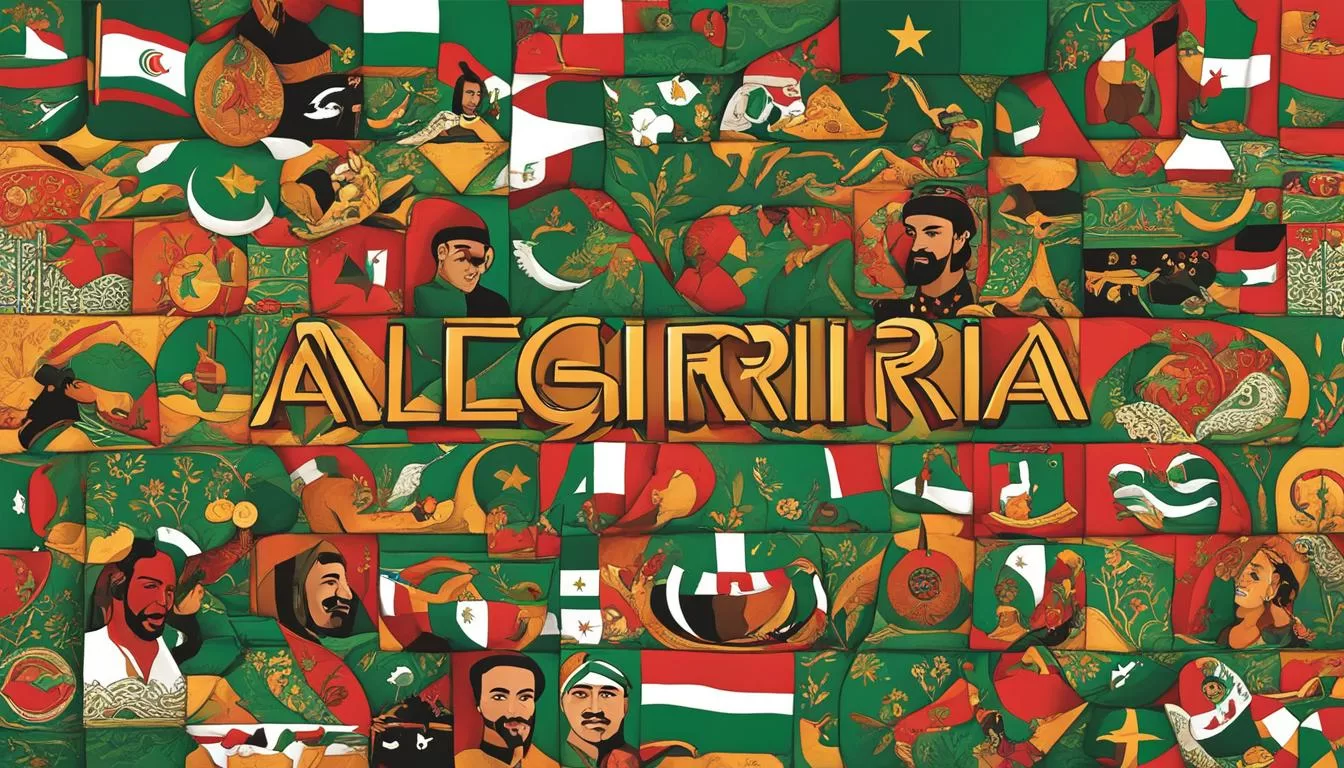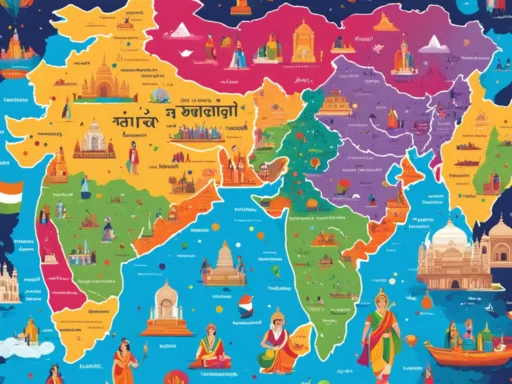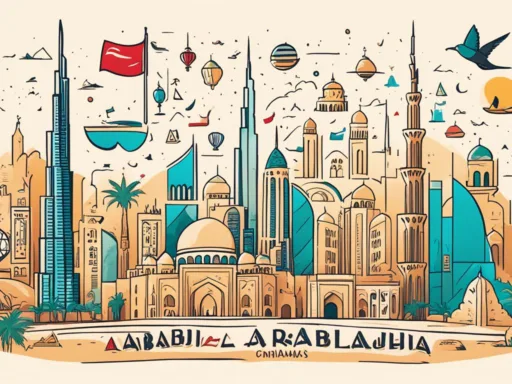Algeria, a country with a burgeoning cultural tapestry in North Africa, is home to a symphony of languages that tell stories of its rich history and diverse populace. The languages spoken in Algeria reflect its intricate blend of ethnic groups, historical influences, and societal changes. At the official level, Arabic and Tamazight, known also as Berber, serve as the primary linguistic conduits for the nation’s administrative, educational, and cultural expressions.
Amid the panorama of the spoken languages in Algeria, Arabic holds a significant place, echoed by its widespread use among approximately 72% of Algerians. Its dialects, rich and varied, provide not just a means of communication but also a facet of national identity and cohesion. Side by side, the prominence of Berber languages, including the preeminent Kabyle and Shawiya dialects, underline the historical and current richness of languages in North Africa. French also remains pertinent, continuing to play a significant role in the media, education, and the Algerian dialogue with the world, despite its absence from the roster of official languages.
Key Takeaways
- Algeria features a rich linguistic diversity, with Arabic and Tamazight as official languages.
- Arabic dialects and Berber languages reflect Algeria’s complex cultural heritage.
- The influence of French persists in various social spheres, evidencing the colonial legacy.
- The multilingual nature of Algeria embodies the exchange of indigenous and external influences over time.
- Understanding the languages spoken in Algeria offers insight into the nation’s identity and the patterns of its historical narrative.
A Tapestry of Tongues: An Overview of Algeria’s Linguistic Landscape
The harmonious interweaving of linguistic threads in Algeria paints a vivid portrait of its ethnolinguistic diversity. Traversing the historical crossroads of civilizations, Algeria has cultivated an environment where multiple languages spoken have flourished. As we delve into this rich linguistic heritage, we uncover the official languages of Algeria and the vernacular that percolates through the veins of this North African nation.

At the heart of Algeria’s multilingual identity lies a deep traditional fabric, composed of native tongues and regional inflections.
Algeria’s Multilingual Heritage
Algeria’s historical narrative is etched in the linguistic imprints of Berber dynasties, Ottoman sovereignties, and French colonial pasts, making its regional languages a testimonial to a conglomerate past. This vibrant heritage is sustained by an array of dialects, each emblematic of the communities and eras that have thrived within Algeria’s borders.
Official Languages: Arabic and Tamazight
In the official domain, the mastery of Arabic in Algeria is unsurpassed and is poignant in both written and spoken forms. Algerian Arabic dialects, with their unique features and adaptability, signify the dynamics of cultural identity. Meanwhile, the elevation of the Berber languages in Algeria, including Tamazight, to official status reflects a reverent nod to the indigenous. The prominence of Tamazight, which includes dialects such as Kabyle and Shawiya, marks a pivotal moment in the linguistic tapestry of the nation.
The Role of Language in Algerian Identity
The languages of Algeria are not mere tools of communication but are carriers of cultural identities. The linguistic landscape, featuring both the prevalence of Algerian dialects and the resilience of Berber languages, is an intrinsic element of Algeria’s national persona, weaving together the threads of its societal fabric.
| Language | Percentage of Speakers | Official Status |
|---|---|---|
| Arabic | 72% | National and Official Language |
| Tamazight (Berber) | 27.4% | National and Official Language since 2016 |
| French | Widely Spoken (No official status) | Used in media and education |
Deep Dive into the Official Languages of Algeria
The landscape of Algeria’s linguistic heritage is like a richly woven tapestry, with official languages leaving a distinctive imprint on the nation’s culture and identity. Modern Standard Arabic and Tamazight stand out prominently, illustrating Algeria’s multifaceted history and its embrace of both the Arab and Berber heritages.
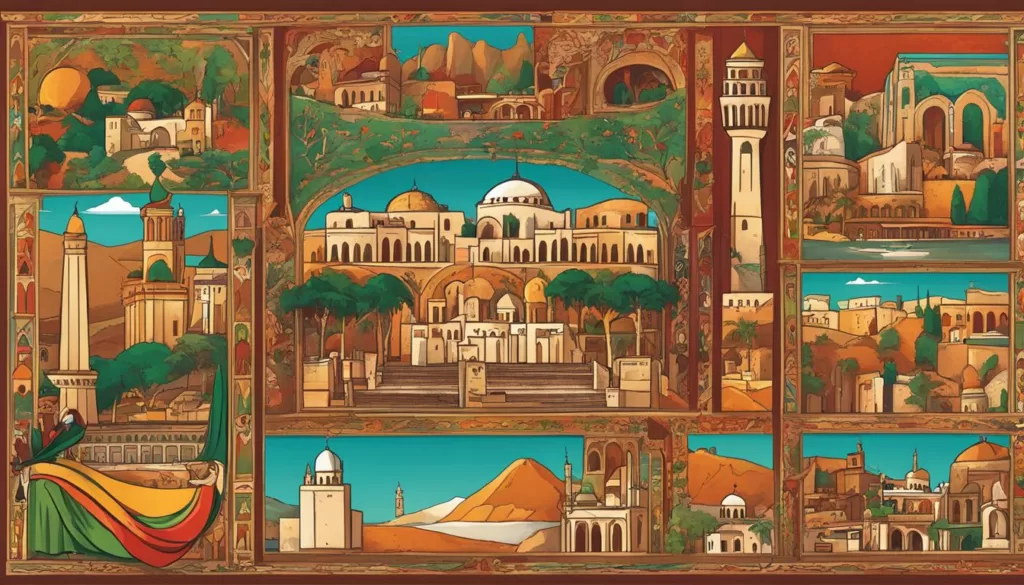
Modern Standard Arabic and its Presence in Algeria
Modern Standard Arabic is not just a language of ceremonial stature in Algeria; it’s the educational bedrock for the nation’s citizens. Taught extensively in schools, it provides a standardized linguistic framework for formal and literary communications. Yet, the modern standard Arabic in Algeria is just one side of the linguistic coin. The colloquially spoken Arabic, teeming with nuances influenced by the Berber, Turkish, and French lexicons, diverges considerably from its standard counterpart, forging its own identity as part of Algeria’s linguistic mosaic.
Tamazight (Berber) – From National to Official Recognition
Recognition of Tamazight has ascended dramatically since the turn of the century, vaulting from acknowledgement as a national to an official language, encapsulating the evolving dynamics of Tamazight recognition in Algeria. This progression honors not only the language’s historic resonance within Algeria but also its contemporary ubiquity across the Kabyle communities and the vast Sahara. Such recognition is a testament to the enduring significance of Berber languages in Algeria, reinforcing the nation’s commitment to preserving and fostering its indigenous linguistic roots.
| Language | Presence | Status | Role and Influence |
|---|---|---|---|
| Modern Standard Arabic | School curriculum, official documentation | Official Language | Literary and formal communication |
| Spoken Algerian Arabic | Common colloquial language | N/A | Identity and cultural cohesion |
| Tamazight (Berber) | Regional communities, Kabylie | Official Language since 2016 | Historical significance, indigenous identity |
The role that these official languages of Algeria play cannot be overstated. While Modern Standard Arabic forges a link to the wider Arab world, the Algerian dialects connect individuals to their home and community. Tamazight’s ascent is a clarion call to the country’s diversity, asserting the narrative of a land rich in cultural and linguistic plurality.
Regional Dialects: Unlocking Algeria’s Linguistic Richness
Algeria’s symphony of regional languages testify to its rich cultural fabric, woven through centuries of history, migration, and influence from afar. While the official languages cover formal communication, it is the everyday speech among Algerians that color the country’s linguistic landscape with a brilliant palette of dialects and accents.
The Spectrum of Algerian Arabic Variants
Algerian Arabic variants echo through the bustling cities and quiet villages, each strain differing from the next. These dialects, shaped by their regions, are the soulful expression of Algeria’s Arabic-speaking majority. From Algiers to Annaba, the linguistic tapestry offers a fascinating glimpse into the daily lives of Algerians.
Darbali – Spoken in the West, deeply influenced by Moroccan Arabic.
Orani – From the lively streets of Oran, this variant carries Spanish and French intonations.
Constantinois – Exhibits a unique melodic flow, prevalent in the East.
In these diverse expressions, the Algerian Arabic variants demonstrate an adaptive and evolving language, ever enriched by its interactions with regional cultures and historical incursions.
Berber Languages: Kabyle, Shawiya, and Beyond
The Berber linguistic legacy is encapsulated by the melodious Kabyle language, predominantly spoken in the Kabylie region, and the Shawiya dialect of the Aurès Mountains. As cornerstones of the Berber languages in Algeria, these tongues nurture the threads of indigenous narratives and customs.
| Language/Dialect | Regions Spoken | Number of Speakers |
|---|---|---|
| Kabyle | Kabylie, Algiers, and scattered across Algeria | Approximately 5 million |
| Shawiya (Tachawit) | Aurès Mountains | Estimated 2 million |
| M’zab (Mozabite) | M’zab Valley | Significant minority |
This intricate mosaic of dialects and idioms reflects a deep homage to Algeria’s manifold history. It is within the day-to-day communication of its people that the true essence of Algeria’s linguistic richness emerges, offering a boundless horizon of understanding and appreciation for this North African nation.
Arabic Dialects and Their Role in Algerian Society
The intricate web of Algerian dialects offers a unique lens into the societal fabric of this North African nation. These dialects, the lifeblood of daily communication amongst Algerians, do more than facilitate conversation. They form the crux of cultural identity, acting as bridges connecting the country’s present to its storied past. Arabic in Algeria, with its multitude of localized inflections and idiosyncrasies, is a testament to the country’s vibrant cultural mosaic.
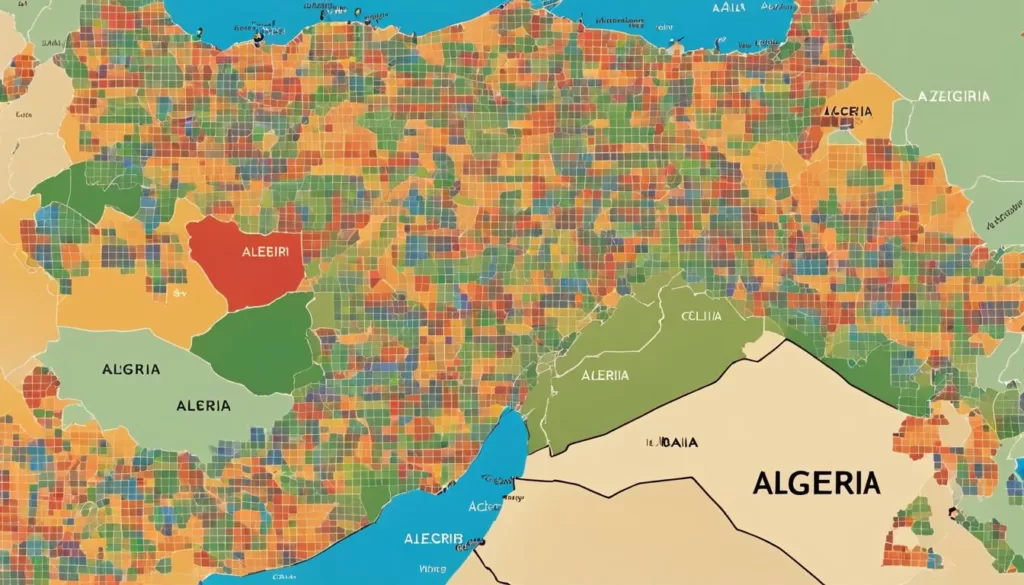
Within Algeria’s borders, the prevalence of Arabic is not homogenous but rather a tapestry of spoken languages in Algeria, each with its rhythm, color, and texture. From the Andalusi-influenced dialects of the north to the more conservative Bedouin vernaculars of the Sahara, Algerian Arabic, or “derja” as it is colloquially known, assumes various forms that reflect the nation’s diverse influences.
The role of these dialects extends beyond mere communication, serving as emblems of community and shared history. Through the flow of Algerian Arabic, individuals find common ground, fostering a collective identity crucial for social cohesion even as the nation embraces its linguistic diversity.
| Algerian Arabic Variants | Regions Spoken | Percentage of Speakers | Cultural Influence |
|---|---|---|---|
| Algerian Saharan Arabic | Sahara region | Significant minority | Conservative, Bedouin dialects |
| Derja | Nationwide | Majority of the population | Blend of Berber, Turkish, French |
| Andalusi Arabic | Northwestern Algeria | Varies by locale | Historical migration influence |
Algerian dialects are not just vehicles for communication but mirrors reflecting the society’s cultural layers. They are pillars that uphold the country’s linguistic architecture, accommodating modern vernaculars and ancient lexicons. The Algerian approach to Arabic is indicative of the country’s broader narrative — one of adaptation and reverence for its cultural roots.
As we continue to explore this multi-hued linguistic nation, the significance of Arabic dialects as a cornerstone of Algerian society reaffirms itself. It’s not merely about the words that are spoken but the shared heritage and the forward journey of a nation they represent.
French in Algeria: A Lingua Franca with Colonial Roots
The narrative of French language in Algeria depicts a vivid swath in the country’s linguistic tapestry. Beyond being one of the key languages spoken in Algeria, French bears the indelible mark of the nation’s colonial history, maintaining its relevance in various sectors of contemporary Algerian life. Aptly regarded as a lingua franca for diverse communicative purposes, the French language’s span of influence encompasses the realms of education, media, and beyond, underscored by a historical precedent and resilient interpersonal connections between Algeria and France.
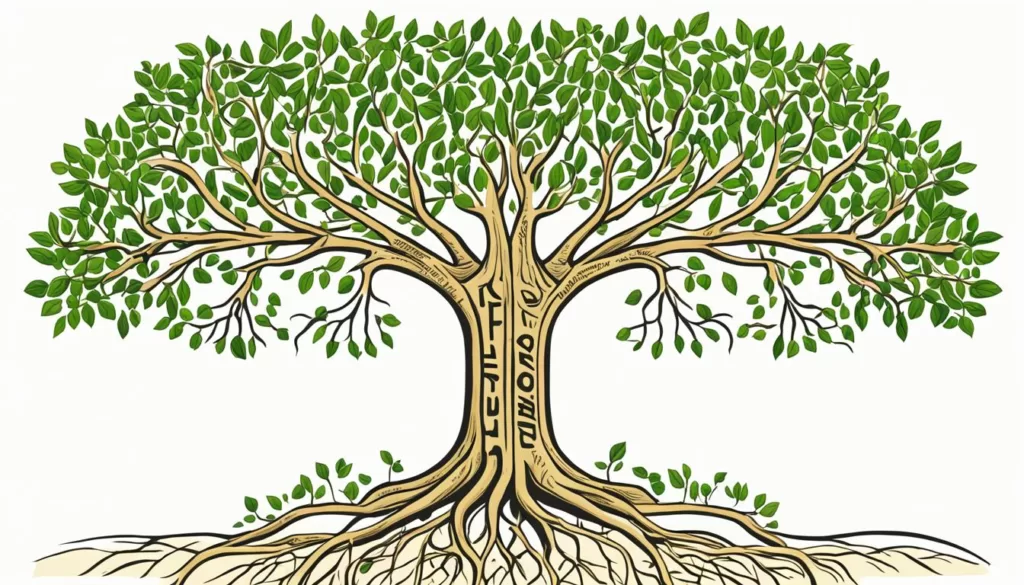
Despite lacking official designation, French has actively sustained its presence in the Algerian societal matrix. The intergenerational passage of the language reflects not only a colonial residue but also the adaptability and resilience of cultural practices in the wake of historical shifts.
French in Education and Media
Foremost among the bastions of French in Algeria is its enduring role within the educational framework. Integrated into the Algerian school system, French assumes a supplementary guise, facilitating access to a breadth of knowledge and serving as a bridge to global discourse. This engagement is mirrored in the media landscape where French navigates alongside Arabic, bolstering a dynamic plurilingual public sphere.
French Language Skill Levels Among the Algerian Population
The proficiency levels in the French language in Algeria exhibit considerable variance, with a substantial proportion of the populace capable of reading and writing in French. This reflects the complexity of Algeria’s linguistic inheritance, influenced by varying degrees of exposure and educational opportunities. A historical undercurrent flows through this facet of Algerian society, with the nuances of French fluency speaking to personal histories and the wider story of Algeria itself.
| Language | Role in Algeria | Educational Presence | Proficiency among Population |
|---|---|---|---|
| French | Media, Commerce, Education | Included in school curriculum | High variability, many can read and write |
The persistent facility of French within Algerian society imparts intriguing implications for the perception of language as a vessel for cultural identity and international connectivity. Its sway over such varied sectors despite the lack official status is a testament to the interconnected nature of language, history, and social evolution in the continued narrative of languages spoken in Algeria.
Language Education and Policy in Algeria
Algerian society’s mosaic of tongues is a direct result of its complex linguistic policy and educational approaches. The country’s multilingual character is strongly influenced by government-led initiatives like Arabization, which have significantly shaped the language education in Algeria. Despite the evident dominance of Arabic, there’s a burgeoning movement towards promoting native languages in Algeria, reflecting a nuanced approach to cultural preservation and state identity.
“Arabization” and Its Impact on Language Learning
Following independence, Algeria set forth to re-establish its cultural identity through Arabization — a sweeping language policy in Algeria aimed at removing the remnants of French colonial influence. The cornerstone of this policy was to install Arabic as the primary language of instruction across all levels of education. While this bolstered a nationalistic sentiment, it also sparked contention, particularly among the country’s Amazigh population, who saw the potential erasure of their own linguistic heritage.
Despite its initial aim to foster unity, Arabization in Algeria has encountered several stumbling blocks. Schools became battlegrounds for cultural preservation, as French remained deeply embedded within various facets of Algerian society, including higher education and international commerce. This policy, however, did succeed in elevating the status of Arabic, emphasizing its relevance both within educational frameworks and the broader societal context.
Strategies and Challenges in Promoting Native Languages
The tireless efforts aimed at promoting native languages in Algeria, particularly Tamazight, culminated in its official recognition in 2016. This was a landmark decision in Algerian language policy, not only validating the language’s cultural significance but also responding to decades-long demands for a more inclusive national identity that honors linguistic diversity. However, challenges remain.
Ensuring equitable language education in Algeria for both Arabic and Tamazight is an ongoing endeavor, with a push for curriculum development and teacher training for the latter. Moreover, the government faces the delicate task of maintaining Arabic’s stature while promoting a multilingual ethos that embraces Algeria’s diverse linguistic roots — a delicate balance that is crucial for sustaining harmony in Algeria’s social tapestry.
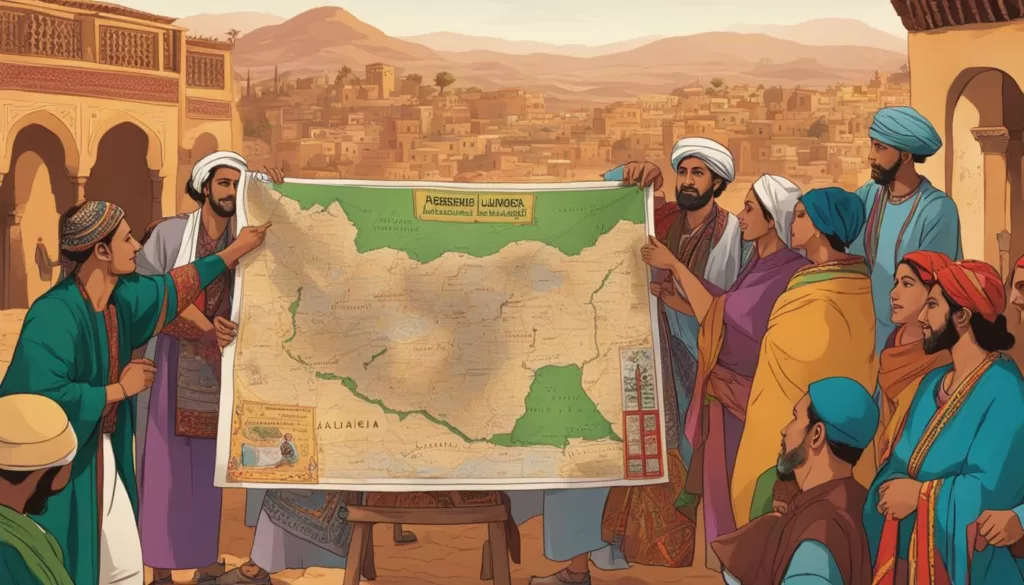
In sum, the linguistic landscape of Algeria stands as a testament to the country’s rich cultural history and its dynamic progress towards embracing the multitude of voices that resonate within its borders. Through the solidification of language education and policy in Algeria, the nation continues on its trajectory to reconcile its storied past with an inclusive future.
The Intangible Threads: Algerian Sign Language and Minority Languages
Within Algeria’s diverse linguistic mosaic, there exists an often-unheard yet equally significant form of communication: Algerian Sign Language. As an essential means of interaction for the deaf community, this sign language allows members to engage fully with society, ensuring inclusivity in the rich tapestry of Algerian culture. Just as the spoken languages of Algeria weave stories of the nation’s fabric, so too does Algerian Sign Language articulate the narratives of those who communicate differently.
Aside from the dominant Arabic and Tamazight dialects, several minority languages in Algeria reflect the country’s complex social architecture. Languages such as Touareg, spoken by the Tuareg people of the Sahara, and Shenwa, native to the Dahra region, are integral to the unique identities within the nation. These languages serve as sociolinguistic anchors for their speakers, offering a profound sense of belonging and cultural heritage.
Though they may not be prominent in daily transactions or official discourse, these minority languages are pivotal in preserving Algeria’s linguistic heritage. They embody the resilience and adaptability of a nation that has seen successive waves of cultural influence yet manages to retain the distinctiveness of its smaller communities. Within educational and policy frameworks, there lies the critical challenge of safeguarding these languages, ensuring they continue to enrich Algeria’s cultural dialogue and heritage.
| Language | Community | Use in Daily Life | Cultural Significance |
|---|---|---|---|
| Algerian Sign Language | Deaf community | Communication and Education | Fosters inclusivity, expression of identity |
| Touareg | Tuareg people | Daily communication, Ceremonial | Maintains nomadic traditions, Saharan heritage |
| Shenwa | People of Dahra region | Daily communication within community | Preserves regional mountainous culture |
The celebration of these minority languages not only affirms their speakers’ identities but also serves as a reminder of the importance of language in societal inclusion. By recognizing and supporting these lesser-known linguistic threads, Algeria continues its journey towards a truly harmonious and multicultural society.
Conclusion: Embracing Algeria’s Linguistic Heritage
Algeria’s linguistic landscape is rich with diversity, emblematic of a nation that proudly wears its historical and cultural complexities. Modern Standard Arabic and Tamazight, standing tall as official languages, embody Algeria’s dual Arab and Berber heritage. They are conduits of ancestral narratives, distinct identities, and symbols of national pride. French, with its deeply entrenched colonial roots, continues to form a significant part of the Algerian vernacular, highlighting continued connections and indicative of a society in flux.
From the bustling streets of Algiers to the serene Saharan oases, Algeria’s regional dialects paint a vivid picture of its cultural mosaic. Algerian Arabic variants and Berber languages such as Kabyle and Shawiya dance through daily interactions, underscoring Algeria’s multifaceted identity. And with the inclusion of Algerian Sign Language, the narrative extends to embrace all corners of Algerian society. This linguistic dynamism is not a mere footnote in Algeria’s story but a central theme revolutionizing the way we understand national identity.
In sum, the languages of Algeria are not just a matter of state policy but a celebration of a people’s journey through time. They are vibrant symbols of resilience, adaptability, and the eternal human spirit to express and connect. As we ponder the intricate threads of Algeria’s linguistic tapestry, we understand that language is more than a tool—it’s the living, breathing soul of a nation.
FAQ
What Languages are Spoken in Algeria?
Algeria is a linguistically diverse country with Arabic and Tamazight (Berber) serving as the official languages. French, although not an official language, is widely spoken. In addition, multiple regional dialects including various Berber languages and Arabic variants enrich the linguistic landscape of Algeria.
How Do Languages Reflect Algeria’s Multilingual Heritage?
The languages spoken in Algeria reflect its rich history of migrations, colonial influences, and a blend of indigenous cultures. Arabic, the Berber languages, and French demonstrate the country’s diverse ethnic and cultural backgrounds, with each language contributing to the nation’s multifaceted identity.
What Are the Official Languages of Algeria?
The official languages of Algeria are Arabic and Tamazight. Arabic has held official status since 1963, while Tamazight was declared an official language in 2016 after being recognized as a national language in 2002.
What Role Does Language Play in Algerian Identity?
Language plays a pivotal role in shaping Algerian identity, symbolizing cultural unity through Arabic and highlighting the indigenous heritage through Tamazight. The use of Arabic promotes solidarity among Algerians, whereas Tamazight’s recent official status reinforces the recognition of the country’s Berber roots.
How Does Modern Standard Arabic Feature in Algeria?
Modern Standard Arabic is primarily used in formal contexts such as education, literature, and official governmental matters in Algeria. It is the version of Arabic taught in schools and differs significantly from the local dialects spoken by the population.
How Has Tamazight’s Recognition Evolved in Algeria?
Tamazight, commonly known as the Berber language, saw a rise in recognition when it became a national language in 2002, further solidified by its official status in 2016. This reflects the Algerian government’s acknowledgment of the language’s cultural importance and historical significance.
What Are the Major Algerian Arabic Variants?
Algerian Arabic variants are numerous and geographically diverse. Notable dialects include Algiers Arabic, Oran Arabic, and Constantine Arabic, among others. Each variant bears unique characteristics influenced by historical, cultural, and social factors.
What Are the Main Berber Languages Spoken in Algeria?
The Berber languages in Algeria include several dialects with Kabyle and Shawiya being predominant. Kabyle is spoken mainly in the Kabylie region, while Shawiya is used in the Aurès Mountains. Other Berber dialects like Mozabite and Tamahaq are also integral to the linguistic tapestry of Algeria.
What Is the Role of French in Algerian Society?
French plays a significant role in Algerian society as a legacy of the colonial era. It serves as a common second language and is widely used in education, media, and commerce. French proficiency is seen as advantageous and is prevalent across different segments of the population.
What Impact Has “Arabization” Had on Language Learning in Algeria?
The “Arabization” movement in Algeria, which began post-independence, sought to replace French with Arabic as the primary language in society, particularly in the educational system. This movement has significantly influenced language policy and learning in Algeria, fostering a stronger emphasis on Arabic in various domains.
What Strategies and Challenges Exist in Promoting Native Languages in Algeria?
The promotion of native languages in Algeria, such as Tamazight, has faced challenges in balancing the dominance of Arabic. The government has adopted strategies including officially recognizing Tamazight to ensure cultural representation and preservation in education and national affairs.
Does Algeria Have a Sign Language or Minority Languages?
Yes, Algeria also has its own sign language known as Algerian Sign Language, used by the deaf community. Furthermore, the country hosts minority languages spoken by select groups, reflecting the richness of Algeria’s cultural diversity.

